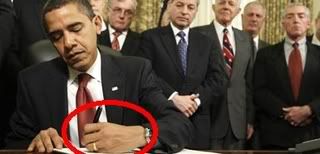The most interesting and important interview (to me) in this supersaturated news cycle was Fareed Zakaria's CNN sit down with Wen Jiabao, the leader of China, no doubt one of the few world leaders who can speak intelligently about the works of Marcus Aurelius and Adam Smith. (I guarantee that neither Bush or McCain ever even heard of Smith's Theory of Moral Sentiments even if they've got The Wealth of Nations theme of "Free Markets" tattooed on their ass.)
The Chinese Premier believes we're in this together and all should share in fixing the credit crisis. Think about what an amazing shift this is from the isolation of "Red" China of just a few decades ago, where the Great Wall extended into their economic policy (and still dominates their internet access). However, if we don't get our house in order, this should be a signal that a credit squeeze, loss of value by international shareholders of Wall Street firms combined with a recessionary business cycle triggered plummeting housing values could quickly turn into a catastrophe that makes memories of the Great Depression seem like the good old days.
Wen, who is known for his openness and economic mastery, told Zakaria that despite the impressive growth his country has experienced over the past 30 years, things have changed because of the United States' subprime problems. "We have seen a decline in external demand, and China's domestic demand cannot be significantly increased in a short period of time. [So] we do risk a slowdown. We must re-adjust macroeconomic policy," Wen says. "A U.S. recession would certainly have an impact on China's economy. Ten years ago, China-U.S. trade stood at only $102.6 billion. Today the figure has soared to $302 billion-a 1.5-fold increase. A shrinking of U.S. demand would certainly have an impact on China's exports. And U.S. finance is closely connected with Chinese finance. If anything goes wrong in the U.S. financial sector, we would be anxious about the security of Chinese capital."
I think this confirms my analysis that without some kind of bailout that gets the credit markets going again, quickly, we risk exactly the historic meltdown Warren Buffet warns about.
I got the feeling that Premier Wen was trying to at least reassure us that they weren't considering cashing in all those T-Bills they hold and trigger a Boy And His Dog world. At least not yet. But he didn't obscure the fact that they may have no choice if we don't get 'er done.
They are willing to go along to a point, accepting the end of 10% plus growth and entering a period of more sustainable expansion. But unlike us, they won't tolerate a true recession there, a zero or negative period of economic growth without tapping into their savings -- so much of it tied into credit granted the US government to feed our war lust and conspicuous consumption. Remember, they've already cut off lending to US banks, which is hardly the way a "partner" who wants to "share the burden" all that much.
Maybe they'll conclude that no matter how bad a global economic implosion might hurt the USA, they'll suffer even more and will let it ride -- because any hint that they'd pull out of their "investment" in America would seal everyone's doom. (And you really have to know where to look to infer there was even a hint given, but not a threat.) We can only hope the threat doesn't become more blatant as things go from bad to suck in the next couple of years.
Weirdly, Wen spoke of the "real" American economy as fundamentally strong -- which he defines as our technical and manufacturing base, our innovative abilities. Interestingly enough, the head of the People's Republic didn't define our economic "fundamentals" in the transparently cynical way John McCain tried to redefine how stupid he sounds when talking all things economic.
So once again, for reasons no one in the government or the media cares to discuss, I've convinced myself that the bailout needs to happen or we face dire consequences. The devil being in the details, I'll be taking a close look at what comes out of the sausage factory on Capitol Hill, and some of the wacky ideologically driven alternatives that have been offerend recently.
 Exposing the lack of compassion by conservatives and
debunking right wing hypocrisy at every opportunity.
Exposing the lack of compassion by conservatives and
debunking right wing hypocrisy at every opportunity.





 Subscribe via Email
Subscribe via Email
1 Comment:
Thanks. I appreciate your comments as I'm trying to decide what to say to my Congressional representatives when I call them (again!) tomorrow. It seems to me that a nation that relies on finance & consumerism instead of manufacturing as the basis of its economy will not be able to sustain itself. There is no "there" there. This has to change.
We may just have to take this bad bailout medicine and choke on it, but I just can't get over the feeling that we are being royally screwed.
POST A COMMENT